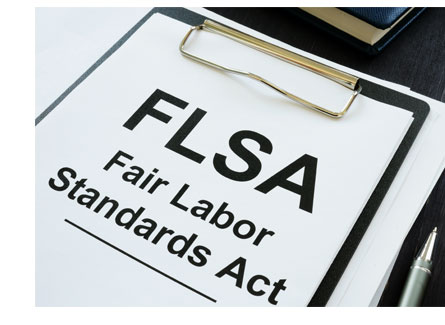 |
THIS ISSUE'S HEADLINES
Employees Texting in the Workplace: Some Practical Tips
Keeping You Informed: New Laws That Impact Consumers and Investors
DOL Releases Two Final Rules On Overtime Pay Under The FLSA

EMPLOYEES TEXTING IN THE WORKPLACE: SOME PRACTICAL TIPS
Fake news. Fake videos. Deep fakes. We have all heard stories of people photoshopping or faking photos to make others look bad or create a scandal. However, an equally disturbing trend is emerging: fake text messages. There are numerous sites and apps available to create fake (but very real-looking) text messages.  These tools allow you to customize the carrier name, battery percentage, wi-fi, timestamp, and other aspects of the message to make it look as real. These tools allow you to customize the carrier name, battery percentage, wi-fi, timestamp, and other aspects of the message to make it look as real.
To paraphrase a familiar saying, a fake text message can go halfway around the world before the truth gets its boots on. Therefore, employers should understand that, given the ease with which text messages can be faked, they must proceed cautiously and thoughtfully when dealing with workplace issues that involve text messages. For example, if someone is accused of harassing another employee via text message, an employer should keep in mind that the text message might have been faked, so further questioning and follow-up of the sender and recipient will be needed to ensure that an adequate investigation takes place. Another issue that could arise is someone seeks revenge on another employee and circulates a fake text message to get the other employee disciplined or fired. This new technology creates an additional hurdle that employers must overcome when managing their workplaces and investigating employee misconduct. For more information on social and digital media issues in the workplace or other employment and business law matters, please contact PLDO Partner Brian J. Lamoureux at 401-824-5100 or email bjl@pldolaw.com.
[back to top]

KEEPING YOU INFORMED: NEW LAWS THAT IMPACT CONSUMERS AND INVESTORS
With the new year, several new Rhode Island laws are set to take effect. Two of these new laws may have a direct effect on consumers and investors, and are worth a closer look.
Sustainability Designation: The Secretary of State, in coordination with the Department of Environmental Management, will begin issuing certifications showing that certain businesses have met transparency and sustainability standards established by the State.  To obtain this certification, a business must formally adopt the State’s sustainability standards, display a link on its website that displays the criteria for meeting the standards (established by a third party), and also display a report that the business will file with the Secretary of State identifying the business’s actions in achieving the sustainability standards. The Secretary of State is now promulgating the sustainability standards contemplated by this law. While there is no legal requirement to adopt such standards and the certification is entirely voluntary for the business, there may nevertheless be incentives for a business to seek out such certification, especially if the standards do not impose a significant burden on the business. Both consumers and investors are becoming much more conscious about businesses’ conduct and commitment to sustainability. Seeking the certification may be a cost-effective way to distinguish your business. To obtain this certification, a business must formally adopt the State’s sustainability standards, display a link on its website that displays the criteria for meeting the standards (established by a third party), and also display a report that the business will file with the Secretary of State identifying the business’s actions in achieving the sustainability standards. The Secretary of State is now promulgating the sustainability standards contemplated by this law. While there is no legal requirement to adopt such standards and the certification is entirely voluntary for the business, there may nevertheless be incentives for a business to seek out such certification, especially if the standards do not impose a significant burden on the business. Both consumers and investors are becoming much more conscious about businesses’ conduct and commitment to sustainability. Seeking the certification may be a cost-effective way to distinguish your business.
Real Estate Disclosure: Sellers of residential real estate that represent one- to four-unit dwellings must now disclose any “modifications” to heating, electrical, plumbing and ventilation systems. Previously, sellers were only required to disclose “improvements,” “repairs,” or “defects.” The legislation originally required the seller to disclose whether the property had been used to cultivate cannabis; however, critics responded that such a requirement would create legal and medical privacy concerns. This new language will still require cultivators who made modifications for cultivation to disclose those modifications, but will not require disclosure of the cultivation itself. Sellers should be aware that real estate agents and sophisticated purchasers may likely understand the import of such modifications. In theory, the neutral language “modification” would also require further disclosures across the board, but, in practice, it is unclear how this change will affect most real estate disclosures. If you have questions about these new laws or other business matters, please contact Attorney Joshua J. Butera at 401-824-5100 or email jbutera@pldolaw.com.
[back to top]

DOL RELEASES TWO FINAL RULES ON OVERTIME PAY UNDER THE FLSA
Two new final rules have been released by the Department of Labor (“DOL”) which update the Fair Labor Standards Act (“FLSA”). These rules will impact how an employer calculates paying an employee overtime under the FLSA.
1. The DOL released a final rule on September 24, 2019, which makes adjustments to overtime exemption rules under the FLSA. The final rule became effective January 1, 2020, and as of now, employers must be in compliance with this overtime change.The new rule raises the minimum salary threshold, making more employees eligible for overtime.
 Under the new rule, for an employee to be exempt from FLSA overtime requirements, an employee’s salary must be $684 per week or $35,568 per year. The new rule further raises the minimum salary necessary for an employee to be exempt from overtime as a highly-compensated employee to $107,432 annually. Under the new rule, for an employee to be exempt from FLSA overtime requirements, an employee’s salary must be $684 per week or $35,568 per year. The new rule further raises the minimum salary necessary for an employee to be exempt from overtime as a highly-compensated employee to $107,432 annually.
2. On December 12, 2019, the DOL announced a final rule which clarifies and provides guidelines on how to calculate the regular rate of pay. The final rule will be effective January 15, 2020, and it focuses on clarifying if certain benefits and perks must be included in a regular rate of pay calculation.
The regular rate of pay requirements are used to define what an employer includes in a time and a half calculation for paying overtime to employees under the FLSA guidelines. The final rule clarifies that an employer may exclude the following from an employee’s regular rate of pay:
- parking benefits, wellness programs, onsite specialist treatments, gym access and fitness classes, employee discounts on retail goods and services, certain tuition benefits, and adoption assistance;
- unused paid leave;
- payments of certain penalties employers must pay under state and local scheduling laws;
- reimbursed expenses such as cellphone plans, credentialing exam fees, organization membership dues and travel expenses that don't exceed the maximum travel reimbursement under certain regulations;
- sign-on and longevity bonuses;
- employer provided coffee and snacks;
- discretionary bonuses (the DOL further clarified that the label given to a bonus doesn't determine whether it is discretionary); and
- contributions to benefit plans for accidents, unemployment, legal services and other events that could cause a financial hardship or expense in the future.
It is critical that employers review these final rules to determine if their overtime payment structure is in compliance with the FLSA. For more information on these final rules or other legal issues, contact PLDO Attorney Katherine D. Bishop at 401-824-5100 or email kbishop@pldolaw.com.
[back to top]
|
 |




 These tools allow you to customize the carrier name, battery percentage, wi-fi, timestamp, and other aspects of the message to make it look as real.
These tools allow you to customize the carrier name, battery percentage, wi-fi, timestamp, and other aspects of the message to make it look as real.  To obtain this certification, a business must formally adopt the State’s sustainability standards, display a link on its website that displays the criteria for meeting the standards (established by a third party), and also display a report that the business will file with the Secretary of State identifying the business’s actions in achieving the sustainability standards. The Secretary of State is now promulgating the sustainability standards contemplated by this law. While there is no legal requirement to adopt such standards and the certification is entirely voluntary for the business, there may nevertheless be incentives for a business to seek out such certification, especially if the standards do not impose a significant burden on the business. Both consumers and investors are becoming much more conscious about businesses’ conduct and commitment to sustainability. Seeking the certification may be a cost-effective way to distinguish your business.
To obtain this certification, a business must formally adopt the State’s sustainability standards, display a link on its website that displays the criteria for meeting the standards (established by a third party), and also display a report that the business will file with the Secretary of State identifying the business’s actions in achieving the sustainability standards. The Secretary of State is now promulgating the sustainability standards contemplated by this law. While there is no legal requirement to adopt such standards and the certification is entirely voluntary for the business, there may nevertheless be incentives for a business to seek out such certification, especially if the standards do not impose a significant burden on the business. Both consumers and investors are becoming much more conscious about businesses’ conduct and commitment to sustainability. Seeking the certification may be a cost-effective way to distinguish your business.  Under the new rule, for an employee to be exempt from FLSA overtime requirements, an employee’s salary must be $684 per week or $35,568 per year. The new rule further raises the minimum salary necessary for an employee to be exempt from overtime as a highly-compensated employee to $107,432 annually.
Under the new rule, for an employee to be exempt from FLSA overtime requirements, an employee’s salary must be $684 per week or $35,568 per year. The new rule further raises the minimum salary necessary for an employee to be exempt from overtime as a highly-compensated employee to $107,432 annually.